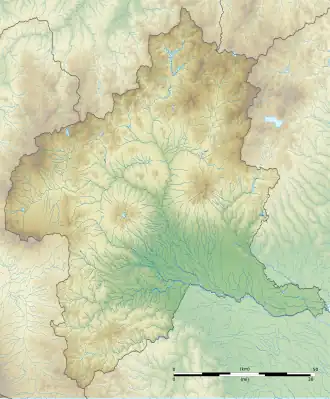Chōkoku-ji
| Chōko-ji | |
|---|---|
長谷寺 | |
Chōko-ji Hondō | |
| Religion | |
| Affiliation | Buddhist |
| Deity | Jūichimen Kannon Bosatsu |
| Rite | Kinpusen Shugen Hon-kyō |
| Status | functional |
| Location | |
| Location | 3583 Shiraiwa, Takasaki-shi, Gunma-ken |
| Country | |
 Shown within Gunma Prefecture  Chōkoku-ji (Japan) | |
| Geographic coordinates | 36°23′07″N 138°55′57.4″E / 36.38528°N 138.932611°E |
| Architecture | |
| Founder | Tokudo Shonin |
| Completed | c.Nara period |
| Website | |
| Official website | |
| } | |
Chōko-ji (長谷寺) is a Buddhist temple located in the Shiraiwa neighborhood of the city of Takasaki, Gunma Prefecture, Japan. It belongs to the Kinpusen Shugen Hon-kyō sect of Japanese Buddhism and its honzon is a statue of Jūichimen Kannon Bosatsu. The temple's full name is Shiraiwa-san Chōko-ji (白岩山 長谷寺).The temple is the 15th stop on the Bandō Sanjūsankasho pilgrimage route. [1]
Overview
The foundation of this temple is uncertain. According to the temple's legend, it was founded by either a priest named Tokudō (who is credited with carving the Kannon images as Hase-dera, whose name is written in the same kanji as this temple, or by the ascetic monk En no Gyōja and that Gyōki carved its Jūichimen Kannon statue. As if to cover all bases, it is also said that both Saichō and Kūkai visited the temple. What is certain is that the temple enjoyed the patronage of the Minamoto clan from the Kamakura period, and although it was destroyed by various disasters on many occasions, it was rebuilt with the assistance of the Nitta clan, Uesugi clan and others. In 1566, during the wars of the Sengoku period, it was destroyed by the armies of Takeda Shingen when he attacked Minowa Castle. It was reconstructed by 1580. The temple had been a center for Shugendō since its foundation, but when Shugendō fell from official favor in the Meiji period, the temple briefly came under the Tendai sect. It joined the modern incarnation of Shugendō headed by Kinpusen-ji in Yoshino, Nara after World War II.
The temple is located approximately one hour by car from Tochigi Station on the JR East Ryōmō Line
Cultural Properties
Gunma Prefectural Important Cultural Properties
- Wooden standing Jūichimen Kannon Statuell (木造十一面観音立像), honzon, Heian period, 186-cm tall[2]
- Wooden standing Jūichimen Kannon Statuell (木造十一面観音立像), maedachi, Kamakura period, 185-cm tall.[3]
References
- ^ Yuichi Kobayashi (2020). 坂東三十三ヶ所札所めぐり 観音霊場巡礼ルートガイド. Meitsu shuppan. ISBN 4780426049.
- ^ "群馬県内の県指定文化財一覧" (in Japanese). Gunma Prefectural Board of Education. Retrieved August 20, 2020.
- ^ "群馬県内の県指定文化財一覧" (in Japanese). Gunma Prefectural Board of Education. Retrieved August 20, 2020.
Gumma-ken kotogakko kyoiku kenkyukai (2005). Gemma-ken no rekishi sampo. Yamakawa Shuppan. p. 75. ISBN 978-4-634-24610-2.
External links
![]() Media related to Chōkoku-ji (Takasaki) at Wikimedia Commons
Media related to Chōkoku-ji (Takasaki) at Wikimedia Commons
- Bando 88 Places Pilgrimage official site(in Japanese)
- Takasaki official tourist information home page(in Japanese)